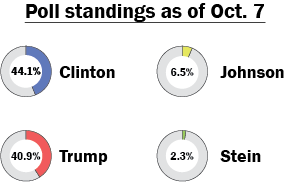
Designed by Anna Simoneau
The 2016 presidential election has been anything but conventional.
The faded appeal of “traditional candidates” is steering Americans away from major party nominees and driving them toward third-party candidates such as Gary Johnson of the Libertarian Party and Jill Stein of the Green Party.
Polls demonstrate that Hillary Clinton, the Democratic nominee, and Donald Trump, Republican nominee, are polling first and second, respectively — but their third-party opponents’ campaigns are still grabbing the attention of the voters who are tired of typical politicians.
According to a poll released by Real Clear Politics on Oct. 7, Hillary Clinton is ahead with 44.1 percent and Donald Trump trails at 40.9 percent. Gary Johnson and Jill Stein remain behind at 6.5 percent and 2.3 percent, respectively.
Michael Miller, ’17, commented on the polarization of the major political parties.
“There is just a ton of party gridlock,” Miller said. “One side puts an idea out and the other side is immediately opposed to it, so that is driving people away from the two-party system.”
Jigar Patel, ’17, the president of Lehigh College Democrats, said politicians are not listening to what people want.
The lack of confidence U.S. citizens feel regarding this election can be attributed to the radicalized stance of both the Democratic and Republican candidates.
The two candidates are divided on a host of issues, including the limitations of private campaign financing. The Democratic Party supports enforcing limits on financing while the Republican Party opposes these limitations. Regardless of their stances, both parties have large companies and lobbyist groups backing them with massive amounts of funding.
Patel said third parties don’t have that financial support, because they don’t have lobbyist groups backing them.
“After the 2008 meltdown, I think people started feeling that things weren’t working correctly,” said Frank Davis, an associate professor in the department of political science. “And I think that some of the most grotesque increases in campaign spending have made people feel that the system is being bought and their votes matter less.”
Many people feel as if a vote for a third-party candidate is an unproductive vote because, statistically, there is not a strong chance of a third-party candidate winning the election.
“I think it’s doing a disservice to democracy to say something like ‘don’t waste your vote,’” Miller said. “I know it’s a cliché thing to say, but I would think that if you’re not going to vote on who you think would do the best job, then that is wasting your vote.”
Other voters feel they must use their vote to ensure that one candidate loses.
“People are just voting for one of the main two-party candidates to stop the other from winning,” said Max Weiss, ’17, the president of Lehigh College Republicans. “So while Gary Johnson or Jill Stein might be serious candidates, they don’t have enough support, media coverage or money to really get their names out there.”
At her speech in Reno, Nevada, in August, Hillary Clinton said Trump’s statements and rhetoric are congruent to ideologies of the “alternative-right” movement.
Messages from representatives of the alt-right movement are mainly communicated through online media sources. The alt-right movement is centered on the belief that white nationalism is fundamental, and the movement has been associated with white supremacists. Alt-right members are said to consist mostly of young, white males who are unified in their stance against multiculturalism, immigration, feminism and political correctness.
“There’s been an opportunity for these people to be seen more, partially because immigration has become an issue, and is not always carefully spoken about,” Davis said.
The alt-right movement has recently gained more attention, as evidenced by its expanded media coverage and increased acknowledgements in various articles. The movement has not necessarily gained popularity and traction, but it has gained national attention.
After such an election, people like Alex Brint, ’17, are hopeful that citizens will expand their general political knowledge and turn to other, less extreme candidates.
“It’s going to open people’s eyes that there are other people running for the election,” Brint said. “For the long term, we would be able to hear other opinions rather than just far left and far right.”
This election has altered peoples’ opinions of mainstream politicians.
“The rise of the third parties is more of a political revolution,” Patel said. “It’s not going to affect this election, but it will affect future elections.”





Comment policy
Comments posted to The Brown and White website are reviewed by a moderator before being approved. Incendiary speech or harassing language, including comments targeted at individuals, may be deemed unacceptable and not published. Spam and other soliciting will also be declined.
The Brown and White also reserves the right to not publish entirely anonymous comments.